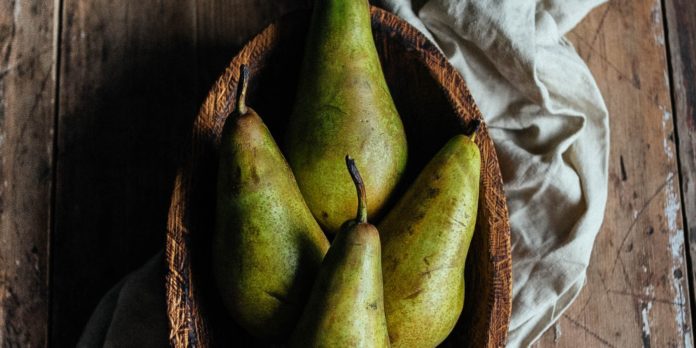Overview of African Pear
It is a delicious seasonal fruit. African pears can be found in abundance between April and September.
The fruit is widely consumed in African countries. Africa’s pear tree is also known as Ube (Nigeria), Safou (Cameroun), Atanga (Equatorial Guinea and Gabon), the Butternut tree, and Bush pear.
The purple skin and pulp are consumed while the seed is thrown away or composted. Fresh roasted corn is usually served alongside it, either boiled or roasted.
The African pear is extremely nutritious and beneficial to one’s health.
Facts About African Pear
African pears are high in antioxidants and nutrients. They may be beneficial in the prevention of heart disease, diabetes, cancer, constipation, and other digestive disorders, among other conditions.
Most of the calories in fruits like African pear come from their high concentration of healthy fats.
Among the potential health benefits are the following:
Nutrient Content of African Pear
African pears are a powerhouse of vitamins and minerals. Approximately 100 grams of fruit pulp will provide you with the following benefits:
- 20 gram of protein
- 48 g of fat
- 3 g dietary fiber
- 15 g carbohydrate
- 3 g vitamin C
- Calcium: 133 milligrams (mg).
- 65 mg potassium
- 10 mg sodium
- 13 mg zinc
In contrast to most fruits, African pears have a high protein content that makes them unique. Healthy fats, such as palmitic acid, linoleic acid, and stearic acid, will keep you fuller for longer.
The fruits are all abundant in vitamin C, calcium, potassium, zinc, magnesium, folate, and sodium, all nutrients such as fiber.
A diet high in nutrients, such as African pears, will help strengthen your immune system, prevent disease, and encourage healthy cell growth.
Health Benefits of African Pear
Promotes the Growth of Teeth and Healthy Bones
African pears to ensure that your bones and teeth are as strong as possible. Because of the presence of calcium and phosphorus in African pears, they will be beneficial in promoting the health of teeth and bones in the long run.
These minerals are important for healthy bones, working muscles, a strong immune system, and making and keeping blood clots.
Good Oral Health
It is believed that African pears contain a significant number of antimicrobial properties. As a result, they are presently being used to manufacture toothpaste in some parts of Africa.
Additional research has revealed that these powerful properties are also effective in combating bacteria, which is a common cause of bad breath and tooth decay.
Because of this, it is recommended that you increase your pear fruit intake in order to speed up your recovery if you are looking for a natural way to deal with either of these two mouth conditions.
High Blood Pressure
The consumption of African pears can assist in lowering high blood pressure. This is a result of the presence of potassium in it that this is the case. This will have the outcome of lowering the level of blood pressure.
As a result, it has the possibility to improve heart health and reduce the risk of having a stroke. To obtain this advantage, you must consume five servings of fruit per day.
Antioxidants
Immune system-boosting substances known as antioxidants aid the body in its fight against disease-causing free radicals.
In the African pear’s purplish skin and greenish pulp, there are powerful antioxidants known as carotenoids that have been demonstrated to reduce the risk of diseases such as type 2 diabetes, heart disease, and cancer.
Furthermore, the leaves contain a high concentration of flavonoids, which are powerful antioxidants that aid in the prevention of free radical damage.
Useful During Pregnancy
You might be astonished to learn that the African pear is a superfruit for pregnant women. It contains naturally occurring folic acid, which is extremely beneficial during pregnancy.
The folic acid in bush pears (also known as African pears) helps to prevent deficiencies in the spinal cord and brain of the developing baby.
African pear is high in sugars, carbohydrates, fiber, folate, pantothenate, and vitamins such as vitamin B6, thiamine, niacin, riboflavin, and vitamin C, which is an antioxidant that helps to fight free radicals in the body. African pear is also high in potassium.
Promotes the Health of the Digestive System
The consumption of African pears aids in the stimulation of the digestive system. It aids in the proper digestion and assimilation of dietary nutrients. As we all know, the digestion system is responsible for the process of nutrient absorption.
A direct result of this is that it helps to establish a link between what we eat and how good and healthy our digestive system is. Apart from that, the fiber in African pears contains pectin, cellulose, and lignin, all of which are resistant to the action of a digestive enzyme.
Consume African pear from now on because it will aid in the promotion of digestion as well as the prevention of the presence of constipation.
Aids in the Treatment of Eye Problems
Amounts cannot be overstated in terms of the importance of Vitamin C for human vision. It aids in maintaining eye health by promoting the formation of eye-related connective tissues, protecting the eyes against damaging free radicals, and lowering the risk of cataracts and vision loss.
 The African pear is also an excellent source of the aforementioned antioxidant [Vitamin C], which means it will help improve your eyesight while also preventing eye-related diseases such as cataracts and a host of others, among other things.
The African pear is also an excellent source of the aforementioned antioxidant [Vitamin C], which means it will help improve your eyesight while also preventing eye-related diseases such as cataracts and a host of others, among other things.
Weight Loss
The ability of African pears to help people lose weight is attributed to a nutrient known as soluble fiber. The fiber fills up your stomach and prevents you from overindulging in foods that can cause you to gain or lose weight. Since then, the fruit has been proven to help people lose weight.
However, for the best results, it is recommended that you follow a dietitian’s recommendation.
Protects the Heart
African pears contain soluble fiber, which helps to protect the heart by lowering bad cholesterol, also known as LDL.
The reduction of bad cholesterol means that the heart’s function is maintained as well as being protected from several conditions such as heart attack and stroke.
Prevents the Development of Cancer
Surprisingly, African pears have been shown to have health benefits, including the ability to prevent cancer. This is as a result of the presence of antioxidants, which aid in the fight against free radicals and diseases in the body.
At this point, it is recommended to consume antioxidant foods such as fruits and vegetables in order to have a healthier body while also preventing cancer.
Skin Health Should Be Promoted
The green portion is rich in oil, which consists of numerous nutrients, while the purple flesh can help in the treatment of some skin diseases such as ringworm, craw-craw, and other similar conditions in the purple flesh.
Nutritionists claim that the pulpy pericarp can be eaten raw or cooked and that it has butter-like qualities, is high in minerals and oil, and is good for the skin.
Like riboflavin, vitamin C is an effective antioxidant and dietary supplement, and both nutrients contribute to the appearance of youthful skin.
Constipation Can Be Curtailed
African pears are good for you because they have soluble fiber, which makes them less likely to make you constipated and more likely to help you have regular bowel movements.
It is composed of pectin, cellulose, and lignin, which are all substances that are resistant to digestion by the digestive enzymes. Pectin is a fiber that aids in the control of diarrhea and the binding of substances in the intestine.
Removes Toxins from the Body’s System
Your body may be harboring a variety of unnecessary organisms as a result of one or more factors, which may lead to the development of certain health conditions.
There is, however, a highly effective method of getting rid of those redundant organisms, and that is through regular consumption of African pears. This fruit contains a significant number of powerful antioxidants, which aid in the removal of unwanted organisms from your body and the improvement of your overall health.
The African pear has also demonstrated exceptional abilities in lowering the incidence of certain diseases while simultaneously inhibiting the oxidation of other molecules in the body.
Diabetes Can Be Managed
Diabetes is a long-term condition. We need the right treatment and prevention in order to deal with this. Diabetic patients need vitamins and minerals to keep their blood sugar levels under control.
Aside from lowering blood sugar levels, the low glycemic index carbohydrates in them help the body digest and metabolize them.
Increases the Effectiveness of the Immune System
Vitamin C in bush pears aids in the improvement of immunity because it enables the immune system to resist certain diseases and maintain a healthy immune system.
 The immune-boosting properties of African bush pear are attributed to the presence of vitamin C and essential minerals, which act as antioxidants and aid in the strengthening of immunity as well as the improvement of the immune system’s ability to fight infection.
The immune-boosting properties of African bush pear are attributed to the presence of vitamin C and essential minerals, which act as antioxidants and aid in the strengthening of immunity as well as the improvement of the immune system’s ability to fight infection.




